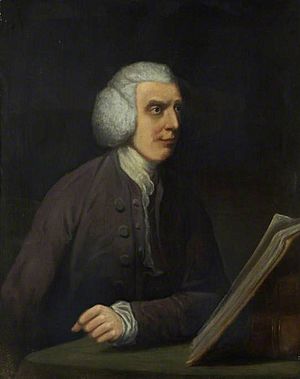Henry Harington facts for kids
Henry Harington (1727–1816) was a talented English physician, musician, and writer. He lived a long life, contributing to both medicine and music in his time.
Contents
A Life of Learning and Music
Henry Harington was born in September 1727 in Kelston, a village in Somerset, England. His father was also named Henry Harington. When he was 18, in 1745, he started studying at The Queen's College, Oxford. He earned his first degree in 1749 and a master's degree in 1752.
While at Oxford, Henry joined a special music club. This club was started by a composer named William Hayes. Only people who were good at reading music quickly could join.
Becoming a Doctor
Henry first thought about becoming a priest. But he changed his mind and decided to study medicine instead. In 1753, he became a doctor in Wells, Somerset. He continued his medical studies and earned his full medical degrees in 1762.
Moving to Bath and Civic Life
In 1771, Henry Harington moved to Bath, Somerset. Bath was a popular city, known for its Roman baths and as a place for people to relax. In his free time, Henry composed music. He also started the Bath Harmonic Society, a group for musicians.
He became a physician to the Duke of York. This was a very important position. Henry also took on roles in the local government of Bath. He became an alderman, which is like a city council member, and a magistrate, a type of judge. In 1793, he even served as the mayor of Bath.
During his time as mayor, from 1793 to 1794, Henry worked hard to keep Bath safe and clean. He was active in trying to improve the city.
The Harington Club
Many years after Henry Harington was mayor, a club was founded in Bath in 1874. It was first called The People's Club and Institute Ltd. Around 1890, the club decided to change its name to honor Dr. Henry Harington. They renamed it The Harington Club. This club still exists today at Harington Place. The site where the club is located has a long history. It was once stables used by Sir John Harington of Kelston during the Battle of Lansdown in 1643.
Henry Harington passed away on January 15, 1816, in Bath. He was buried in the church at Kelston. A monument was placed in Bath Abbey to remember him.
Musical and Literary Works
Henry Harington was a talented composer and writer. He published several collections of his musical pieces.
Musical Collections
His published music collections include:
- A Favourite Collection of Songs, Glees, Elegies, and Canons
- A second Collection of Songs, Glees, Elegies, Canons, and Catches
- A third Collection of Trios, Duetts, single Songs, Rotas
- Songs, Duetts, and other Compositions ... never before published, which was put together by his daughter, Susanna Isabella Thomas, in 1800.
Before these collections, he released some songs separately. Some of his well-known pieces were Eloi! Eloi! or the Death of Christ, a sacred song for Easter week, and the fun The Alderman's Thumb (a glee, which is a song for three or more voices). His songs How great is the pleasure and How sweet in the woodlands were very popular for a time. The tune for How sweet in the woodlands came from an older Italian opera song.
Other Writings
Besides music, Henry Harington also wrote books and poems:
- Ode to Harmony
- Ode to Discord
- The Witch of Wokey (a work about Wookey Hole, a famous cave in Somerset)
- A Treatise on the Use and Abuse of Musick
- The Geometrical Analogy of the Doctrine of the Trinity consonant to Human Reason, published in 1806.
Family Life
In 1752, Henry Harington married Martha Musgrave. They had two sons: Sir Edward Harington, who became a writer, and Henry Harington, who was interested in old artifacts but sadly passed away in 1791. Their daughter, Susanna Isabella (1762–1835), married Josiah Thomas in 1794. Josiah later became a high-ranking priest in Bath.
 | Kyle Baker |
 | Joseph Yoakum |
 | Laura Wheeler Waring |
 | Henry Ossawa Tanner |


